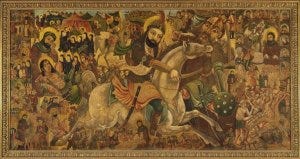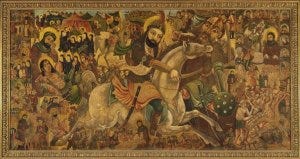Mourning for Ma‘rifah: Ismaili Interpretations of Ashura
“We are the House of Muhammad and as such are more entitled to the authority (walāyah) of this affair over you than these pretenders who claim what does not belong to them… By God there is no son of a Prophet other than me among you and among the peoples from East to West.
Imām al-Ḥusayn ibn ‘Alī
The tenth day of Muḥarram, known as the Day of ‘Āshūra’ is when the Battle of Karbala took place – in which Imām al-Ḥusayn ibn ‘Alī, the second hereditary Imām of the Shī‘ī Muslims, along with his family and supporters, was brutally massacred by the armies of Yazīd ibn Mu‘āwiya ibn Abī Sufyān.

The Imām and the Adversary (ḍidd)
When I ask you to read Kisso (the account of the events at Karbala) it is not because those who read it will go to Paradise, but that you may ponder over it and know the unbelievers fought us. These Prophets and Imāms knew what was going to happen, yet we are not allowed to reveal the mysteries of the Unseen (ghayb).
Imām Āgā Shāh ‘Alī Shāh Āgā Khān II, (transl. Rai Gulamali Kassam Shivji, Calgary November 1989)
The Battle of Karbala, from the esoteric perspective, was the manifestation of the opposition that takes place in every age and time between the forces of the Imām of the Time and the forces of his Adversity (ḍidd). Just as the Imām of the Time is the inheritor of Haḍrat Adam and the vicegerent of God on earth, the Adversary (ḍidd) is the inheritor of Iblīs and the devil (shayṭān) among human beings.




